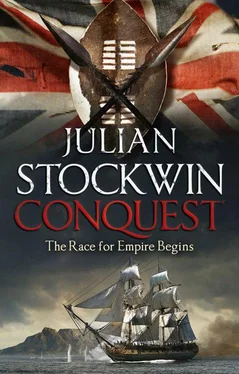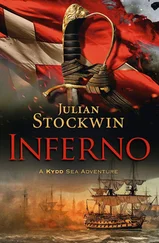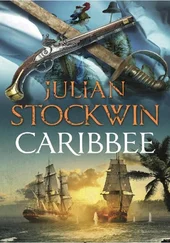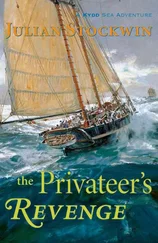Julian Stockwin - Conquest
Здесь есть возможность читать онлайн «Julian Stockwin - Conquest» весь текст электронной книги совершенно бесплатно (целиком полную версию без сокращений). В некоторых случаях можно слушать аудио, скачать через торрент в формате fb2 и присутствует краткое содержание. Жанр: Старинная литература, на английском языке. Описание произведения, (предисловие) а так же отзывы посетителей доступны на портале библиотеки ЛибКат.
- Название:Conquest
- Автор:
- Жанр:
- Год:неизвестен
- ISBN:нет данных
- Рейтинг книги:5 / 5. Голосов: 1
-
Избранное:Добавить в избранное
- Отзывы:
-
Ваша оценка:
- 100
- 1
- 2
- 3
- 4
- 5
Conquest: краткое содержание, описание и аннотация
Предлагаем к чтению аннотацию, описание, краткое содержание или предисловие (зависит от того, что написал сам автор книги «Conquest»). Если вы не нашли необходимую информацию о книге — напишите в комментариях, мы постараемся отыскать её.
Conquest — читать онлайн бесплатно полную книгу (весь текст) целиком
Ниже представлен текст книги, разбитый по страницам. Система сохранения места последней прочитанной страницы, позволяет с удобством читать онлайн бесплатно книгу «Conquest», без необходимости каждый раз заново искать на чём Вы остановились. Поставьте закладку, и сможете в любой момент перейти на страницу, на которой закончили чтение.
Интервал:
Закладка:
A flurry of activity resolved to a dispatch rider arriving. ‘Sir, from Lord Beresford.’ The general had been posted to keep watch on Janssens’s Hollanders, left in the mountains after the Blaauwberg battle.
Baird read the message with a frown and stuffed it into his waistcoat. He glanced around his officers. ‘We’re in it for the long haul, it seems. Janssens has crossed over the Tygerbergs and, circling around Stellenbosch, has taken residence in the Hottentot-Hollands range only some twenty or thirty miles away. Not only that but the castle has dispatched a substantial wagon train of cannon and supplies to him there.
‘Gentlemen – we have decisions to make.’
The worst fear of a commander-in-chief at siege – that a powerful army threatened his rear – was a reality. Janssens had a secure mountain stronghold, which would serve as a point of concentration for the reinforcements now converging. When the time was right he would descend to crush the invaders.
The headquarters tent was unfurnished. It served to keep the fierce afternoon sun at bay, but every officer had to remain standing. Baird drank thirstily from a soldier’s canteen, wiped his mouth and turned to address them.
‘My fellow officers. I will not hide it from you. We are—’
‘Sah – Gen’ral Baird, sah!’ It was the regimental sergeant major of the 71st at the door-flap. ‘L’tenant Grant’s compliments an’ he begs you’d come, um, now,’ he finished woodenly, with an odd expression.
‘Very well, Sar’ Major,’ Baird said, and followed him, his officers hurrying along too: nothing short of a grave threat would have impelled the young lieutenant to intrude.
Standing at the edge of the camp, Grant pointed across the flat ground before the castle to a cavalry officer on a white horse picking his way carefully towards them. He bore a large white flag. When the halfway point was reached he stopped and waited.
‘Good God!’ blurted one officer. ‘The gall of ’em, calling for our surrender before the first shot!’
‘It’s a trick,’ growled another.
‘No, it’s not,’ said Baird, sternly. ‘The Dutch are an odd lot but they know the meaning of honour. L’tenant – do see what it is they want.’
The young man went for a horse, swung up and crossed to the waiting officer. Hats were doffed, words were briefly exchanged and a letter was handed over. With a civil bow, they wheeled their horses around and returned whence they’d come.
Grant handed the letter to Baird. ‘Sir, I’m desired to give you this from the commandant of the castle.’
He took it and gravely broke the seal. As he read it his face worked with emotion. He scanned the words again, then lowered the paper and looked about him, overcome.
‘Read it aloud,’ he choked, handing it to his aide.
‘To the officer commanding His Britannic Majesty’s Army.
Sir, To prevent the consequences which must ensue from the Town and Castle being defended, I hereby propose to you a Cessation of Arms for forty-eight hours to enter negotiations.
I have &c.
Signed,
Lieutenant Colonel Hieronimus Casimirus Baron von Prophalow
Commanding the Town and Castle.’
In an instant the situation had changed beyond belief. The Dutch were asking to treat for conditions leading to a surrender. What had compelled them to do this, when so much was in their favour, was a mystery.
‘If they wish to capitulate, they may do so!’ rapped Baird. ‘General Ferguson, do attend on me at once. Where’s my bloody writing desk? ’
Within an hour Ferguson was on his horse, wending his way to the castle under a white flag. He disappeared inside. Shortly afterwards, as the sun was prettily descending into the sea on the right, he emerged and rode back.
He dismounted and approached Baird, his face like stone, then saluted stiffly and reached into his waistcoat. ‘Sir – I have it!’ he growled and waved a folded and sealed document, only then allowing a triumphant smile.
It was no less than the Preliminary Articles of Capitulation, duly signed, which provided for the immediate cessation of hostilities, the surrender of the Castle of Good Hope and the settlement of Cape Town to His Britannic Majesty.
‘Damn it, would you smoke it? It’s ours now. The Cape is ours, b’ glory!’
Baird had given his orders: in the formal matter of marching in to take possession of the Castle of Good Hope, the massed pipers and drummers of all three Highland regiments would figure, but he had insisted that the Sea Battalion, whose dauntless courage and tenacity had shone on the battlefield, would lead the parade.
Hauling a pair of guns for the last time, their task would be one of peace and triumph: the gun salutes that would proclaim to the world that the castle had now changed hands. Kydd had requested the honour to march with the men, so when the grand parade stepped out with a crash of drums and skirl of pipes, he and Bowden swung along with the seamen.
His heart swelled with pride as they marched around the bastions and casemates of the fortification to a vast parade-ground on the far side. A richly ornamented sergeant major then strode forward to take charge of proceedings; the Sea Battalion and their guns were directed to be drawn up with gun muzzle pointing seaward while regiments of the line marched and counter-marched in a fine show until they were positioned in two blocks, an open lane between them leading to the gates of the castle.
It was not a castle an Englishman would easily recognise: low, and soft mustard yellow, it had a certain Dutch quaintness about it, with a colonnaded bell tower high above the main entrance, the double gates dark and closed.
The pipes and drums stopped, the long ranks rigid and disciplined in the blazing sunshine.
Major General Baird, in full dress uniform, walked his white charger slowly up to the gates and dismounted. They slowly opened and out stepped a single figure in a restrained dark blue uniform. Kydd watched in fascination as the two men bowed extravagantly and spoke together for what seemed an age. Then, with another bow, the officer presented Baird with the keys to the Castle of Good Hope. Both men retired.
A military band started up inside, sounding unfamiliar and outlandish to Kydd’s ears. The Dutch garrison came out, individuals all, but subtly alien: long dark moustaches, swarthy, a foreign cross-swing as they marched. Unlike the striking colour of the British redcoats – in the chaos of a battle a soldier had only to look round to know that he was not on his own and be heartened – here were muted greens, browns and blues, a dark tonality that to Kydd looked anything but rousing.
The Dutch soldiers’ bearing was neither sullen nor mutinous but their faces carried a studied blankness. What were they thinking? That their land, homes and future had been given up by their commandant without a shot fired? That while they languished in captivity in the town where they had taken their ease, British soldiery would now flock to taste the fruits of victory?
The marching ranks headed down the open lane, an endless tramping line of defeated men. At the point where they emerged they were directed to one side, their arms deftly collected and their officers given orders to march them to their barracks.
Eventually the long column ceased. The last of the Dutch had left, and Baird strode forward into the castle followed by his commanders, which included Kydd as the senior naval officer present. They stood for a space, relishing the moment.
The forbidding stronghold was unpretentious, but neat and attractive, the yellow and white finish on the stonework suited to its African setting.
The Batavian standard was still close up at the flagpole. At its base a last Dutch soldier stood to his post, a trumpeter at his side. He saluted Baird stiffly, and while the trumpeter played a thin-sounding call, the colours were struck. He saluted once more, then marched off.
Читать дальшеИнтервал:
Закладка:
Похожие книги на «Conquest»
Представляем Вашему вниманию похожие книги на «Conquest» списком для выбора. Мы отобрали схожую по названию и смыслу литературу в надежде предоставить читателям больше вариантов отыскать новые, интересные, ещё непрочитанные произведения.
Обсуждение, отзывы о книге «Conquest» и просто собственные мнения читателей. Оставьте ваши комментарии, напишите, что Вы думаете о произведении, его смысле или главных героях. Укажите что конкретно понравилось, а что нет, и почему Вы так считаете.









